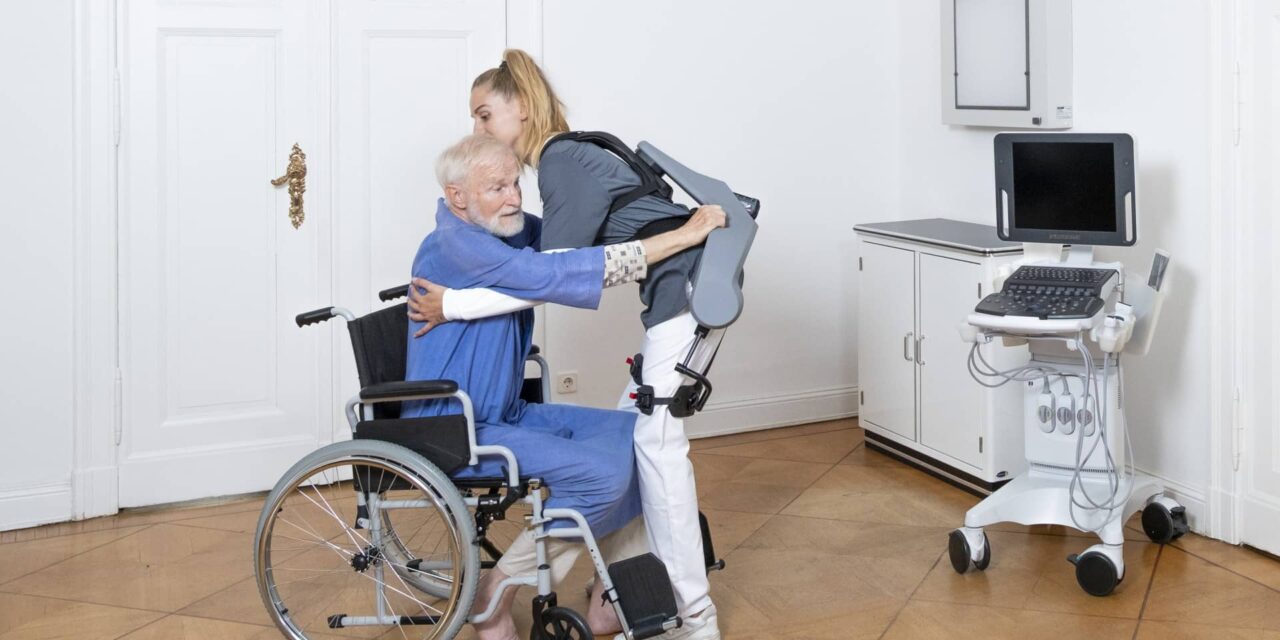Summary:
German Bionic has launched Exia, an exoskeleton powered entirely by Augmented AI, designed to enhance worker safety and productivity across industries by learning and adapting in real time from billions of real-world data points.
Three Key Takeaways:
- AI-Driven Adaptability: Exia uses Augmented AI to interpret user behavior and environmental context, offering real-time, personalized support and continuously improving through usage.
- Industrial Impact: With up to 84 lbs. of lift assistance and proactive injury prevention features, Exia aims to reduce workplace injuries and address labor shortages by making physically demanding jobs safer and more sustainable.
- Integrated Ecosystem: The exoskeleton is part of a connected platform that includes the German Bionic Connect app and IO analytics dashboard, providing ergonomic insights, usage feedback, and seamless device management.
German Bionic, the robotics pioneer that first connected exoskeletons to the cloud, has announced the launch of Exia – its most advanced wearable yet and, according to the company, the world’s first exoskeleton powered end-to-end by true Augmented AI. Informed by insights from billions of real-world motion data points collected across industries including manufacturing, logistics, retail, and healthcare, Exia is purpose-built as a “one-for-all” solution designed to meet the demands of virtually any industry.
Completely rebuilt with a next-generation hardware architecture and optimized control software, Exia utilizes a depth of real data from real working environments to offer any working industry what the company calls the strongest exoskeleton to date – with up to 84 lbs. (38 kg) of dynamic lift assistance. However, it isn’t just stronger – it’s made to be lighter and smarter too.
Using its real data, Exia can anticipate user needs and optimize support in real time, according to the company. Learning from a wearer’s actions and environment, it interprets movement patterns, understands context, and adjusts instantly to provide the most effective support – whether lifting, walking, bending, or carrying.
“Exia represents a breakthrough in human augmentation,” said Armin G. Schmidt, CEO and co-founder of German Bionic. “It’s built not only on years of engineering excellence and the lived experiences of countless workers who already rely on our technology, but also on a foundation of billions of real-world data points. Exia doesn’t merely respond or even just think – it actually learns. With every movement, it grows alongside its user, continuously adapting and evolving to meet the demands of the person and the job at hand.”
Built with Intelligence to Tackle Major Industry Issues
Exia is intelligent from the outset – built on masses of data collected from diverse, real working environments, it understands how people lift, carry, bend, and move in the context of their actual jobs. This depth of field knowledge allows Exia to deliver responsiveness and support right out of the box. But it doesn’t stop there: Powered by an AI-native architecture and the ability to provide over-the-air (OTA) software updates, Exia keeps learning. As it’s used, it fine-tunes its behavior to individual wearers and their specific tasks, becoming even more precise and more effective over time. In this way, Exia continuously grows into a truly personalized partner — always aligned with the realities of the work and the people doing it.
German Bionic’s Exia isn’t just a high-tech innovation – it’s tackling some of the biggest challenges facing today’s industries. Costing U.S. employers over $67,000 per claim on average, musculoskeletal disorders – the kinds of injuries caused by heavy lifting and repetitive strain – are massively hitting productivity and budgets across the U.S. In addition, there’s the labor shortage. Experts predict that by 2033, the U.S. could be short 1.9 million manufacturing workers – highlighting the urgent need to make physically demanding roles safer, more sustainable, and more appealing to secure a stable and capable workforce for now and the future.
By reducing injury risk, increasing productivity, and extending career longevity in physically demanding roles, German Bionic says Exia can help companies both protect their current workforce and attract the next generation of skilled labor.
Key Features of Exia:
· Adaptive Lift Engine: Learns each user’s movement and delivers precisely timed support up to 84 lbs. (38 kg)
· Smart Safety Companion: Real-time digital twin flags high-risk motions and encourages safe practices
· German Bionic Connect App: Empowers users with settings control, usage analytics, and gamified coaching on any smartphone
· German Bionic IO: Advanced cloud analytics platform delivering ergonomic insights, activity monitoring, and fleet management through a user-friendly dashboard
Enhancing Seamless Connectivity and User Engagement
All German Bionic exoskeletons are complemented by the enhanced German Bionic Connect app, which enhances the user experience by providing detailed performance metrics such as steps taken, weight lifted, and usage time. Through its bi-directional communication channel, the app fosters engagement by allowing users to share direct feedback and qualitative insights. This continuous loop of input and improvement delivers a personalized, evolving experience tailored to each user’s needs. By more closely integrating workers with the technology they rely on, the app promotes a sense of ownership, supports workplace safety, and drives high levels of user acceptance.
Together with the Connect app and the exoskeletons, German Bionic’s 360° Human Augmentation approach includes the powerful German Bionic IO data insights platform and additional human-machine interfaces. This fully integrated system enables real-time ergonomic assessments, activity monitoring, and detailed reporting, while also supporting efficient fleet management – all accessible via an intuitive, user-friendly dashboard. Complemented by a video-based Academy offering onboarding tutorials and expert Pro Tips, the platform and app empower users to unlock the full potential of the exoskeleton.
Availability
Exia is available for North American pilot and fleet orders as of May 27 through German Bionic and its authorized partners.
Featured image: Learning from a wearer’s actions and environment, the Exia exoskeleton interprets movement patterns, understands context, and adjusts instantly to provide the most effective support – whether lifting, walking, bending, or carrying. Photo: German Bionic





